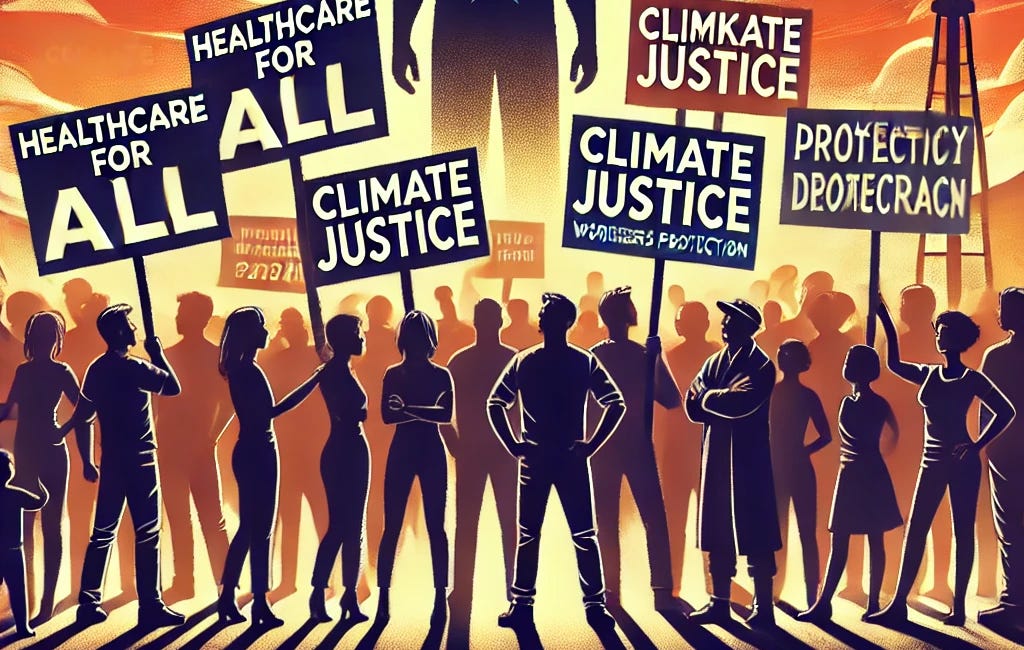Project 2026: Enforcing Truthfulness and Accountability in Public Office
Truth Is Not a Luxury—It’s a Prerequisite for Democracy
As with all Project 2026 writing and ideas, this is just a starting position. Nothing is fixed in concrete, but we must start making a plan. Project 2025 has been in progress for 50 years, and the GOP has been playing the long game. We need to have a plan in place. Opinions, ideas, and suggestions are all welcome.
Public Explainer: Truth Is Not a Luxury—It’s a Prerequisite for Democracy
The Problem: Our Political System Rewards Lying
When a corporate executive lies to shareholders, there are consequences. When a doctor falsifies information, they lose their license. But when a politician lies to the public? They get reelected.
We are now living in a political ecosystem where lies are not punished; they are rewarded. Disinformation campaigns dominate the airwaves, and misinformation goes viral on social media before facts even have a chance to load. Our most powerful elected officials are often the worst offenders.
From COVID denialism to election lies to disinformation targeting marginalized communities, the U.S. has crossed a dangerous threshold. The erosion of trust in public institutions is no longer accidental; it’s engineered. It’s strategic. And it’s working.
The Consequences: Democracy Dies When Truth Is Optional
Public health suffers when elected officials push false claims about vaccines or climate change.
Voter turnout drops when disinformation makes people feel their vote won’t count.
Minority communities are targeted with weaponized lies designed to incite fear or suppress civic engagement.
Foreign and domestic actors alike exploit these lies to further destabilize American democracy.
Without enforceable consequences for public lies, the marketplace of ideas collapses into a propaganda mill.
The Conservative Playbook: Lying as a Feature, Not a Flaw
Project 2025, the right-wing blueprint for seizing control of the federal government, intends to:
Gut the few existing accountability mechanisms (like Inspectors General and the FEC).
Protect political disinformation under the banner of “free speech.”
Undermine public trust so deeply that any fact-based policy proposal is dismissed as part of a “deep state” conspiracy.
In this upside-down worldview, truth becomes tyranny, and lying is patriotism.
The Solution: Truth Must Be Enforceable
We must create a system where truth in public office is not optional; it’s legally required. Just as advertisers can’t make false claims without consequence, neither should politicians.
That means:
Establishing legal consequences for elected officials and campaign entities who spread disinformation.
Rebuilding the Federal Election Commission (FEC) so it can actually enforce ethical standards.
Implementing full transparency in campaign finance and PAC funding, so the public knows who is paying to promote which message.
What We’re Fighting For
We’re not fighting for censorship. We’re fighting for accountability. We’re fighting to make sure that elected leaders serve the people—not manipulate them.
If we want a functioning democracy, then we must demand something simple, profound, and non-negotiable:
Tell the truth—or get out of office.
Project 2026 Policy Proposal
Title: Enforcing Truthfulness and Accountability in Public Office
Policy Objective:
To establish legal and regulatory mechanisms that hold elected officials and campaign entities accountable for knowingly spreading political misinformation and disinformation, and to restore ethical transparency in campaign finance systems.
Section 1: Definitions
1.1. Misinformation: False or inaccurate information, regardless of intent.
1.2. Disinformation: Knowingly false or misleading information deliberately spread to influence public opinion, policy, or electoral outcomes.
1.3. Material Falsehood: A demonstrably false statement made by an elected official or candidate that could reasonably be expected to affect public health, safety, election outcomes, or civic engagement.
1.4. Public Office Fiduciary Standard: A standard requiring elected officials to act with honesty and integrity in their official communications, equivalent to fiduciary obligations in financial or legal professions.
Section 2: Legal Mechanisms for Accountability
2.1. Disinformation as Misconduct in Public Office
Any elected official or public servant who knowingly disseminates disinformation shall be subject to disciplinary action, including:
Public censure
Civil penalties up to $500,000 per violation
Temporary suspension from official duties
Impeachment or removal proceedings, where applicable
2.2. Independent Oversight Commission on Political Integrity (IOCPI)
Establish a new federal body empowered to:
Investigate and adjudicate claims of disinformation
Publish a public-facing fact-checking repository tied to each candidate or officeholder
Refer severe violations to the Department of Justice for potential prosecution under fraud statutes
2.3. Public Office Fiduciary Rule (POFR)
Mandate that all statements made in official capacity (e.g., press briefings, social media, legislative testimony) adhere to the Public Office Fiduciary Standard. Failure to do so may trigger corrective enforcement under IOCPI.
Section 3: Campaign Finance Ethics and Transparency
3.1. Universal Disclosure Requirement
Require all political campaigns, PACs, and affiliated groups to disclose:
All contributions over $500 in real time, via a public digital portal
The source of funds (no anonymous or shell-donor pass-throughs permitted)
All advertising spend, including digital and micro-targeted messaging
3.2. Prohibition of Disinformation in Political Advertising
Ban political advertisements that include materially false claims, with penalties including:
Forced retraction and equal-time corrections
Suspension of broadcast/distribution rights for repeat violators
Disqualification of PACs or candidates from federal matching funds
3.3. Expansion and Reform of the FEC
Eliminate partisan gridlock via an independent commission model (modeled after the CFPB).
Grant enforcement and subpoena authority for ethical violations and disinformation.
Allocate budgetary resources to monitor AI-generated or algorithmically amplified misinformation.
Section 4: Civic Literacy and Public Resilience
4.1. National Truth in Democracy Curriculum
Develop and distribute nonpartisan civic education focused on:
Critical thinking and media literacy
Understanding disinformation tactics
Identifying and reporting political falsehoods
4.2. Public Reporting Incentives
Implement whistleblower protections and financial rewards for reporting disinformation originating from elected officials or campaign surrogates.
Section 5: Constitutional Safeguards
This policy shall not infringe upon protected political speech or dissenting opinion. Enforcement shall apply solely to factual claims made in an official capacity or for political gain that:
Can be proven demonstrably false
Are materially misleading in a way that causes public harm
Are disseminated with intent to deceive
*Essential Reading: Truth, Lies, and Political Power
Disinformation & Propaganda
1. Network Propaganda: Manipulation, Disinformation, and Radicalization in American Politics
Yochai Benkler, Robert Faris, Hal Roberts
A landmark MIT study on how the right-wing media ecosystem functions as an epistemic bubble—radicalizing, isolating, and manipulating its audience through relentless disinformation.
2. The Misinformation Age: How False Beliefs Spread
Cailin O’Connor, James Owen Weatherall
A chilling look at how falsehoods take hold and persist—even when we know better. Essential reading for anyone thinking about institutional trust and public reasoning.
3. Manufacturing Consent
Edward S. Herman, Noam Chomsky
The classic work on media propaganda and elite power. Still terrifyingly relevant in the era of Fox News and algorithmic radicalization.
4. On Tyranny: Twenty Lessons from the Twentieth Century
Timothy Snyder
A pocket-sized manifesto on how democracies collapse when truth is drowned in lies—and how ordinary citizens can fight back.
Political Ethics & Democratic Responsibility
5. Why We’re Polarized
Ezra Klein
A sharp diagnosis of the identity-driven polarization that now defines U.S. politics—and how it erodes the possibility of shared truth.
6. Political Ethics and Public Office
Dennis F. Thompson
This underappreciated gem explores how public officials should be held to ethical standards akin to fiduciary duties—truth included.
7. The Lies of the Land: Seeing Through a Century of Political Spin
Adam Macqueen
A century-spanning tour of political deception. Insightful, funny, and damning in its documentation of how lying became just another campaign tactic.
Campaign Finance & Dark Money
8. Dark Money: The Hidden History of the Billionaires Behind the Rise of the Radical Right
Jane Mayer
An exposé of the shadow network funding the erosion of democratic norms—from the Kochs to DeVos. If you want to understand how lies get bankrolled, start here.
9. Captured: The Corporate Infiltration of American Democracy
Sen. Sheldon Whitehouse
From the front lines of Congress, a searing indictment of how dark money and legal loopholes have captured our legislative process.
10. Republic, Lost: How Money Corrupts Congress—and a Plan to Stop It
Lawrence Lessig
A powerful call for campaign finance reform by one of America’s most respected legal scholars. A must-read blueprint for those who believe truth needs infrastructure.
Legal Frameworks & Institutional Accountability
11. Democracy in Chains: The Deep History of the Radical Right’s Stealth Plan for America
Nancy MacLean
Reveals the libertarian legal theory underpinning today’s right-wing assault on democratic institutions—and how disinformation was baked into the strategy.
12. How Democracies Die
Steven Levitsky, Daniel Ziblatt
Harvard political scientists examine how authoritarianism rises—not through coups, but through lies, norms broken slowly, and accountability systems left to rot.
13. Law’s Infamy: Understanding the Canon of Bad Law
Edited by Austin Sarat
A sobering collection exploring how law can codify harm. Useful context for anyone thinking about how disinformation becomes legal—and how we stop it.
* Books are linked and uncompensated, some may only be available used, ALSO: Fuck Amazon.
Go back to the beginning:
Top 25 Focus Areas for a Progressive Counter-Agenda
A couple of things - these are just my thoughts - I am not emotionally attached to any of this; it’s a starting place because starting with a blank sheet is torture for most people. FEEDBACK and COLLABORATION are necessary.



